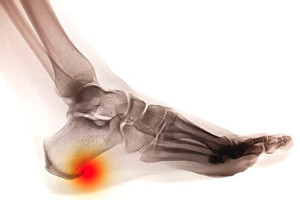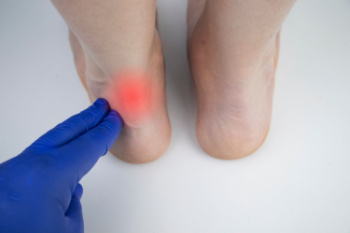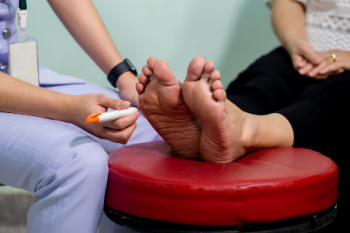Yakima
(509) 225-3668
Ellensburg
(509) 925-4633

A heel spur is a bony growth that forms on the underside of back of the heel bone, often as a result of repeated stress or strain on the foot. It is commonly associated with plantar fasciitis, a condition that causes inflammation of the tissue along the bottom of the foot. While heel spurs themselves may not always cause pain, they can lead to discomfort when they press against the surrounding tissues. To diagnose a heel spur, a podiatrist will typically begin with a physical examination, assessing the foot for tenderness or swelling. An X-ray is the most common diagnostic tool used to confirm the presence of a heel spur, as it clearly shows the bony growth. If the heel spur is causing pain, relief may be found by practicing stretching exercises, and in some cases, orthotics may be prescribed. If you have developed a heel spur, it is suggested that you contact a podiatrist who can offer the treatment that is best for you.
Heel spurs can be incredibly painful and sometimes may make you unable to participate in physical activities. To get medical care for your heel spurs, contact one of our podiatrists from Cascade Foot & Ankle. Our doctors will do everything possible to treat your condition.
Heels Spurs
Heel spurs are formed by calcium deposits on the back of the foot where the heel is. This can also be caused by small fragments of bone breaking off one section of the foot, attaching onto the back of the foot. Heel spurs can also be bone growth on the back of the foot and may grow in the direction of the arch of the foot.
Older individuals usually suffer from heel spurs and pain sometimes intensifies with age. One of the main condition's spurs are related to is plantar fasciitis.
Pain
The pain associated with spurs is often because of weight placed on the feet. When someone is walking, their entire weight is concentrated on the feet. Bone spurs then have the tendency to affect other bones and tissues around the foot. As the pain continues, the feet will become tender and sensitive over time.
Treatments
There are many ways to treat heel spurs. If one is suffering from heel spurs in conjunction with pain, there are several methods for healing. Medication, surgery, and herbal care are some options.
If you have any questions feel free to contact our offices located in Yakima and Ellensburg, WA . We offer the latest in diagnostic and treatment technology to meet your needs.

Cold feet can be a bothersome sensation, often signaling underlying health issues. One of the primary causes is poor circulation, which may stem from conditions such as peripheral artery disease or diabetes. When blood flow is restricted, the extremities do not receive adequate warmth, leading to a chilling effect in the feet. Other factors contributing to cold feet include anemia, which reduces oxygen supply to tissues, and neuropathy, where nerve damage alters sensation. Environmental factors, such as exposure to cold temperatures, can also play a significant role. Lifestyle choices, including smoking and lack of physical activity, may further cause circulation issues. If you consistently have cold feet, it is suggested that you consult a podiatrist who can determine if poor circulation is the cause, and offer effective relief and treatment methods.
While poor circulation itself isn’t a condition; it is a symptom of another underlying health condition you may have. If you have any concerns with poor circulation in your feet contact one of our podiatrists of Cascade Foot & Ankle. Our doctors will treat your foot and ankle needs.
Poor Circulation in the Feet
Peripheral artery disease (PAD) can potentially lead to poor circulation in the lower extremities. PAD is a condition that causes the blood vessels and arteries to narrow. In a linked condition called atherosclerosis, the arteries stiffen up due to a buildup of plaque in the arteries and blood vessels. These two conditions can cause a decrease in the amount of blood that flows to your extremities, therefore resulting in pain.
Symptoms
Some of the most common symptoms of poor circulation are:
Treatment for poor circulation often depends on the underlying condition that causes it. Methods for treatment may include insulin for diabetes, special exercise programs, surgery for varicose veins, or compression socks for swollen legs.
As always, see a podiatrist as he or she will assist in finding a regimen that suits you. A podiatrist can also prescribe you any needed medication.
If you have any questions, please feel free to contact our offices located in Yakima and Ellensburg, WA . We offer the newest diagnostic and treatment technologies for all your foot care needs.

Achilles tendonitis and Achilles tendinosis are two distinct conditions affecting the Achilles tendon, each with different characteristics and causes. Achilles tendonitis is an acute inflammation of the tendon, often resulting from overuse or sudden increases in physical activity. Common symptoms include pain, swelling, and stiffness, particularly during movement. On the other hand, Achilles tendinosis refers to a chronic degeneration of the tendon due to prolonged stress and lack of proper healing. This condition often causes persistent pain and stiffness, especially in the morning or after periods of inactivity. Causes of both conditions include repetitive strain from sports, improper footwear, and biomechanical issues like flat feet or high arches. If you have developed an Achilles tendon injury, it is suggested that you consult a podiatrist who can guide you toward the right treatment solutions for the type of condition you have.
Achilles tendon injuries need immediate attention to avoid future complications. If you have any concerns, contact one of our podiatrists of Cascade Foot & Ankle. Our doctors can provide the care you need to keep you pain-free and on your feet.
What Is the Achilles Tendon?
The Achilles tendon is a tendon that connects the lower leg muscles and calf to the heel of the foot. It is the strongest tendon in the human body and is essential for making movement possible. Because this tendon is such an integral part of the body, any injuries to it can create immense difficulties and should immediately be presented to a doctor.
What Are the Symptoms of an Achilles Tendon Injury?
There are various types of injuries that can affect the Achilles tendon. The two most common injuries are Achilles tendinitis and ruptures of the tendon.
Achilles Tendinitis Symptoms
Rupture Symptoms
Treatment and Prevention
Achilles tendon injuries are diagnosed by a thorough physical evaluation, which can include an MRI. Treatment involves rest, physical therapy, and in some cases, surgery. However, various preventative measures can be taken to avoid these injuries, such as:
If you have any questions please feel free to contact our offices located in Yakima and Ellensburg, WA . We offer the newest diagnostic tools and technology to treat your foot and ankle needs.

Peripheral neuropathy affects the feet by damaging the nerves that carry signals to the lower extremities. Such nerve damage can result in numbness, tingling, burning sensations, and pain, which often begins in the toes. As peripheral neuropathy progresses, people may experience a loss of sensation in their lower extremities. This makes it difficult to detect injuries or temperature changes and can increase the risk of foot sores or ulcers. Muscle weakness or balance issues may develop, leading to instability or difficulty walking. A podiatrist can provide a thorough evaluation, which may include nerve conduction studies, electromyography, or a physical exam. In this way, a treatment plan to manage peripheral neuropathy symptoms, prevent further complications, and improve foot health, can be developed. If you experience foot problems related to neuropathy, it is suggested that you schedule an appointment with a podiatrist.
Neuropathy
Neuropathy can be a potentially serious condition, especially if it is left undiagnosed. If you have any concerns that you may be experiencing nerve loss in your feet, consult with one of our podiatrists from Cascade Foot & Ankle. Our doctors will assess your condition and provide you with quality foot and ankle treatment for neuropathy.
What Is Neuropathy?
Neuropathy is a condition that leads to damage to the nerves in the body. Peripheral neuropathy, or neuropathy that affects your peripheral nervous system, usually occurs in the feet. Neuropathy can be triggered by a number of different causes. Such causes include diabetes, infections, cancers, disorders, and toxic substances.
Symptoms of Neuropathy Include:
Those with diabetes are at serious risk due to being unable to feel an ulcer on their feet. Diabetics usually also suffer from poor blood circulation. This can lead to the wound not healing, infections occurring, and the limb may have to be amputated.
Treatment
To treat neuropathy in the foot, podiatrists will first diagnose the cause of the neuropathy. Figuring out the underlying cause of the neuropathy will allow the podiatrist to prescribe the best treatment, whether it be caused by diabetes, toxic substance exposure, infection, etc. If the nerve has not died, then it’s possible that sensation may be able to return to the foot.
Pain medication may be issued for pain. Electrical nerve stimulation can be used to stimulate nerves. If the neuropathy is caused from pressure on the nerves, then surgery may be necessary.
If you have any questions, please feel free to contact our offices located in Yakima and Ellensburg, WA . We offer the newest diagnostic and treatment technologies for all your foot care needs.